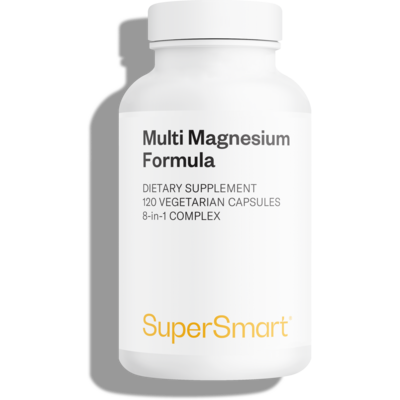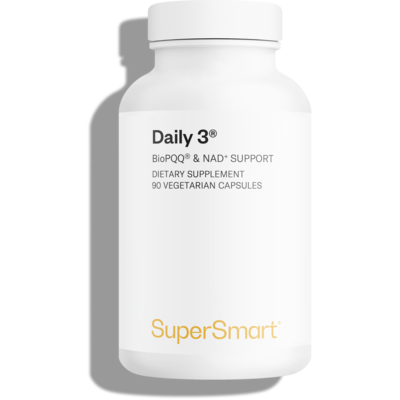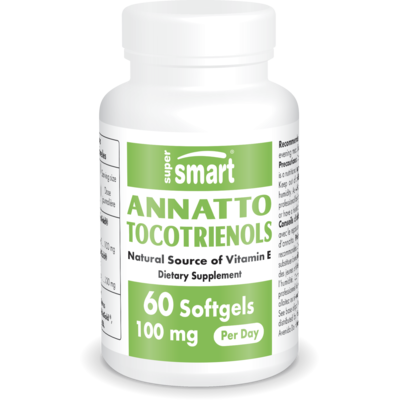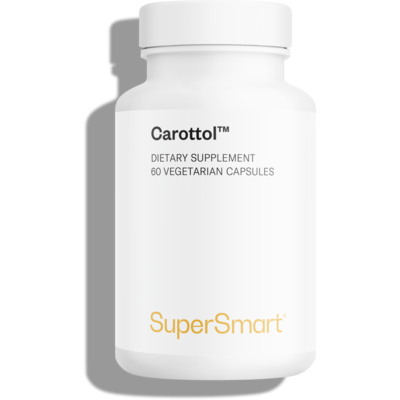Which Supplements Reduce Occasional Fatigue?*
Which Vitamins Support Energy Levels and Stress Management?*
Vitamin B12 is an effective vitamin that helps reduce fatigue.*
It plays a key role in the conversion of macronutrients into cellular energy.* It also supports normal nervous system function and contributes to psychological well-being, making it a valuable nutrient for stress-management and balance.*
The most bioavailable form of B12 is methylcobalamin. It is efficiently absorbed and utilized by the body.*
Another Essential Vitamin for Energy Support*
Vitamin C supports the conversion of nutrients into energy, enhances the absorption of iron, and plays a key role as a cofactor in noradrenaline production, a neurotransmitter associated with focus and positive mood.*
Well known for its role in immune support, it also helps protect cells from oxidative stress, which can impact overall well-being.*
Encapsulating vitamin C in liposomes—small, tailor-made vesicles—enhances its absorption.* That’s exactly what we offer with our supplement Liposomal Vitamin C.
An Essential Trace Mineral for Energy and Stress Support*
In addition to vitamins, minerals play a key role in this area. Magnesium, in particular, is known for its role in supporting energy levels and promoting relaxation.*
Magnesium is an essential trace mineral involved in more than 300 biochemical reactions in the body.* It supports ATP production (a key energy source for cells), contributes to muscle function, and helps maintain a balanced nervous system.*
Stress can increase the body's demand for magnesium, potentially leading to lower magnesium levels, which may affect nervous system balance.* This can create a cycle of increased tension and fatigue. To support energy levels and relaxation, maintaining an adequate intake of highly bioavailable magnesium—such as magnesium orotate in capsules—can be beneficial.*
Ginseng: A Traditional Herb for Energy and Vitality*
Another well-known natural ingredient for supporting energy levels is ginseng (Panax Ginseng), often referred to as the king of tonic herbs in traditional Chinese practices.*
Many studies have explored ginseng’s potential to support energy levels.* This adaptogenic plant is known for promoting physical endurance and supporting healthy circulation, which is linked to cognitive function.* Its effects are largely attributed to active compounds called ginsenosides.
Ginseng is widely recognized and used to support the body’s response to physical and mental stress.*
What Is Fatigue and What Causes It?
Fatigue is characterized by a feeling of tiredness and low energy. It may affect the ability to perform physical or mental tasks.*
Fatigue can be caused by:
- Intense or prolonged effort (physical or mental) combined with insufficient recovery time, often referred to as being ‘overworked’.
- Lack of sleep or poor-quality sleep.
- Unbalanced diet, including excessive processed foods with low nutrient content.
- High levels of stress, which can drain both the mind and body.
- Dehydration, as inadequate water intake may affect physical and mental performance.
- An excessively sedentary lifestyle, which can contribute to lower energy levels.
- Underlying health concerns that may require medical attention.
How Can You Support Your Energy Levels if You Often Feel Tired?
If you often feel tired and struggle with daily activities, the following measures may help support your energy levels and overall well-being:*
- Establish a pattern of restorative sleep. Go to bed at a consistent time and reduce screen exposure before sleep.
- Incorporate regular breaks. Allow time between activities to prevent feeling overworked.
- Maintain a balanced diet and stay hydrated. Focus on fruits, vegetables, lean proteins, seeds, and still water, while minimizing processed or sugary foods.
- Engage in physical activity. Regular exercise can help support energy levels, mood, and sleep quality.
- Practice stress management. Techniques such as breathing exercises, meditation, and yoga can promote relaxation and help prevent stress-related fatigue.
If you continue to experience fatigue despite these lifestyle adjustments, it may be helpful to consult a healthcare professional.
Understanding Everyday Fatigue vs. Persistent Fatigue
Everyday fatigue, which occurs due to known factors and improves with rest, differs from persistent fatigue, which may stem from multiple lifestyle and physiological influences.
Even with sufficient rest and stress management, some individuals may still experience persistent tiredness that impacts daily activities. This may include waking up without feeling refreshed or occasionally experiencing a sense of heaviness or reduced energy.
If fatigue persists and significantly impacts daily life, consulting a healthcare professional can help assess potential underlying factors and provide personalized guidance.
What Are the Best Foods to Support Energy Levels?*
As we’ve seen, a balanced diet contributes to overall well-being and daily energy levels.*
The most important thing is to maintain a balanced intake of carbohydrates, protein, and fats, which serve as sources of energy for the body. This can be achieved through a varied diet that includes fruits, vegetables, lean proteins, and healthy fats.
Some foods are particularly useful in supporting energy levels:*
- Citrus fruits (oranges, grapefruit, clementines…) provide vitamin C, which contributes to normal energy metabolism*;
- Lean meats (chicken, turkey…) are sources of amino acids and vitamin B12, which plays a role in red blood cell formation*;
- Green leafy vegetables (spinach, broccoli, Brussels sprouts…) contain B vitamins, which support normal energy production*;
- Bananas provide carbohydrates, potassium, and vitamin B6, which contributes to normal protein and glycogen metabolism*;
- Oily fish (salmon, sardines, mackerel…), rich in omega-3s, also provide vitamin D, which supports normal muscle function*;
- Berries (blueberries, raspberries, goji berries…) contain various vitamins and phytonutrients*;
- Nuts and seeds (almonds, walnuts, pumpkin seeds, chia seeds…) offer protein, fiber, healthy fats, and minerals. A nutritious option for overall well-being*;
- Guarana, a natural source of caffeine, is traditionally used for its stimulating properties*;
- Dark chocolate, preferably with a high cocoa content, is a source of magnesium, which contributes to normal muscle function*—but should be consumed in moderation due to its calorie and sugar content.
Explore our range of weight management supplements, supplements to support joint health, bone health supplements, and sports nutrition supplements.*

















